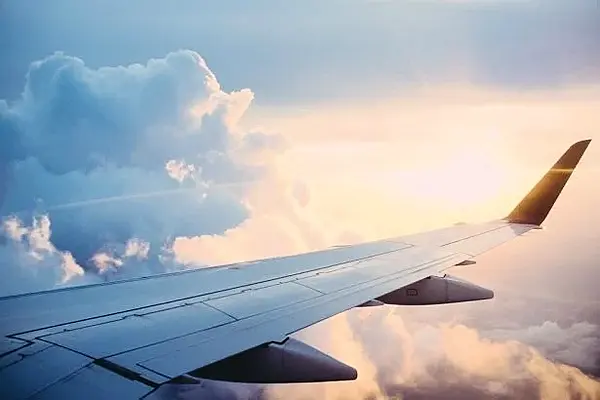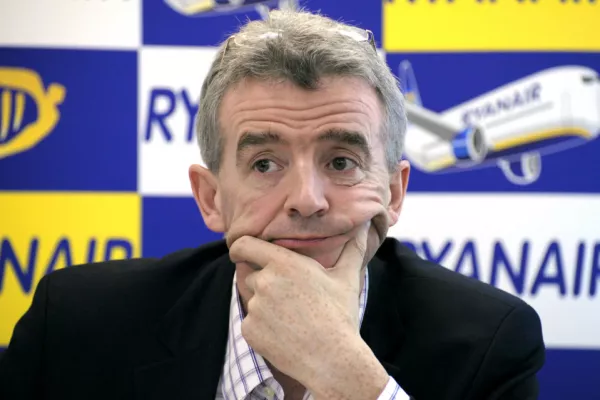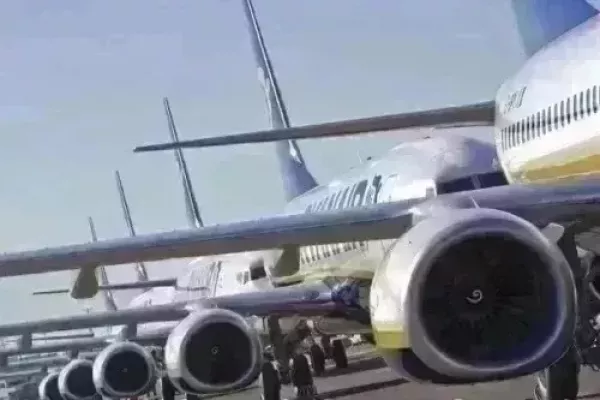Commercial jets delivered by Boeing Co last year will account on average for emissions equivalent to one million tonnes of carbon dioxide each over their 20-year-plus lifespans, a new report from the plane maker has shown.
Boeing is the latest company to report so-called Scope 3 emissions that result when customers use their products, amid pressure from investors and climate activists for data on how companies are performing on limiting their environmental impact.
The report sheds further light on the task facing global aviation as it faces calls by environmental groups for curbs to air travel and growing political pressure to cut emissions, after Europe's Airbus issued similar data in February.
Together, the world's two largest plane makers in 2020 delivered jets estimated to be responsible for total emissions equivalent to 600 million tonnes of CO2 over their lifetimes, a figure dampened by lower deliveries during the pandemic.
Aviation produces up to 3% of man-made CO2 emissions and 12% of CO2 from transport, the industry says. It has pledged to reduce net carbon emissions to 50% of 2005 levels by 2050, but is moving towards a tougher target of eliminating net emissions.
Boeing aims to "significantly reduce our environmental impact during every stage of a product’s life cycle," Boeing chief executive Dave Calhoun said introducing the Chicago-based company's first ever sustainability report this week.
Calhoun reiterated that its jets will fly on 100% sustainable aviation fuels by 2030. Jet engines are currently certified to run on up to 50% of the fuel.
In the report, Boeing said that commercial airplanes that it delivered in 2020 will be responsible for emissions equivalent to 158 million tonnes of CO2, or MtCO2e, over their lifespan.
That consists of 136 million tonnes of emissions directly linked to their operation by airlines, and 22 million tonnes related to the production by energy companies of the fuel used in flight.
Boeing has said that it delivered 157 airplanes in 2020, suggesting each jet will on average generate emissions equating to 866,000 tonnes of CO2 over its lifespan, or 1 million tonnes including indirect emissions linked to fuel production.
High Price Tag
By contrast, in February, said that it had delivered 566 jets in 2020 with estimated lifetime emissions of 440 million tonnes, including 80 million for fuel production.
That equates to lower emissions per airplane compared with Boeing's data, or 636,000 tonnes through direct operations, and 777,000 tonnes including related oil-industry emissions.
Experts said that comparisons are blurred by different assumptions on the average length of a jet's service.
Airbus assumed an average 22-year lifespan for its jets. A Boeing spokesman said that it assumed 22.8 years for single-aisle aircraft, 21.5 years for twin-aisles and 29.6 years for freighters. Based on Boeing's 2020 delivery data by type, that suggests a weighted average of 24.8 years, Reuters calculates.
Boeing also dominates the market for freighters, which fly longer and had an unusually high share of 2020 deliveries.
In 2018, the last year of undisturbed data before Boeing was hit by successive crises over the grounded 737 MAX passenger plane and COVID-19, its emissions per airplane appeared more in line with the trends reported by its rival.
For the 806 jets delivered that year, Boeing expects direct lifetime emissions of 560 millions tonnes, or 652 million including fuel production, a spokesperson said.
Aerospace firms say they are accelerating global research on new technology and promoting cleaner, alternative fuels.
But environmentalist groups insist that flying itself needs to be limited to have a meaningful impact on climate change.
"The data confirms that Boeing’s aircraft come with a high environmental price tag," said Dan Rutherford, aviation director at the International Council on Clean Transportation, an environmental research group based in Washington.
Both Boeing and Airbus say that their estimates do not include the impact of an expected increase in the use of sustainable aviation fuels, which would cut emissions further. The European Union this month proposed new targets for the fuel.
Boeing Turns First Profit In Almost Two Years
The above news comes as Boeing Co posted its first quarterly profit in almost two years as revived domestic travel fuelled 737 MAX deliveries, and shares rose 5% despite festering US-China relations and depressed long-haul travel.
The 737 MAX is integral to Boeing's financial recovery. The US plane maker is scrambling to recoup billions of dollars in lost sales from the pandemic and move beyond the safety scandal caused by two fatal 737 MAX crashes. It also must deal with structural defects of its bigger, more profitable 787 planes.
Higher defense and services sales boosted results and Boeing still expects to turn cash flow positive in 2022. Shares were up approximately 5% at $234 in afternoon trading even as the Dow Jones Industrial Average dipped.
Calhoun told employees in a message that Boeing plans maintain stable staffing with a workforce of around 140,000. Previously, the company had targeted a reduction to 130,000 by the end of 2021.
Calhoun told investors on a conference call, "The US domestic market is showing remarkable recovery", but cautioned that international travel could take longer to pick up. He added that Boeing was worried about COVID-19 variants and a labor shortage in its sprawling supply chain.
"We anticipate a multi-year recovery," Calhoun said.
Boeing's 737 MAX remains grounded in China, where trade tensions between Washington and Beijing have stunted sales. Calhoun said he still expects the 737 MAX to win approval before year-end.
"Hopefully bigger trade issues don't get in the way," Calhoun added.
Before the 737 MAX was grounded in March 2019, Boeing sold a quarter of the planes it built annually to China buyers. For years, simmering geopolitical tensions between Washington and Beijing have caused uncertainty.
Boeing also faces tougher regulatory scrutiny and weak demand for its delayed 777X mini-jumbo, and months of costly repairs and forensic inspections to fix production-related defects on its 787 program.
Boeing reiterated plans to cut 787 production to an unspecified rate lower than five jets per month after finding a new problem, first reported by Reuters, and to deliver fewer than half of the lingering 100 or so 787 Dreamliners in its inventory this year - instead of the "vast majority" it had expected.
"Good news, the inspections are done, toe to tail," Calhoun said. "The underlying causes are getting understood and resolved."
Calhoun added that Boeing may need to rethink its plan for production rate increases if the 737 MAX is not approved in China by year-end.
Boeing said that it has delivered more than 130 737 MAXs since a safety ban on that jet was lifted in November 2020, and that it was building 16 737 MAX jets per month at its Seattle-area factory. It aims to increase output to 31 per month by early 2022.
"Defense markets are strong and they're successfully conserving cash," said Teal Group analyst Richard Aboulafia. "Much depends on the angle of the commercial recovery."
Looking to build momentum, Boeing is preparing to launch its delayed CST-100 Starliner astronaut capsule to the International Space Station on Friday in a crucial do-over test following a near "catastrophic failure" during its 2019 debut.
Calhoun said he is "optimistic, confident" about Friday's launch after software flaws and NASA reviews sidelined its Starliner for 18 months, and about Boeing's ability to compete against newer space players such as billionaire entrepreneur Elon Musk's SpaceX and Jeff Bezos' Blue Origin.
Boeing's core operating profit was $755 million in the second quarter, compared with a loss of $3.32 billion a year earlier. Revenue rose 44% to about $17 billion.
Analysts had on average expected Boeing to report a quarterly loss of $454.8 million on revenue of $16.54 billion, IBES data from Refinitiv showed.
Boeing's commercial airplanes division, its traditional profit powerhouse, reported a quarterly loss of $472 million, but its defense business earned $958 million and its services division took in $531 million.
News by Reuters, edited by Hospitality Ireland. Click subscribe to sign up for the Hospitality Ireland print edition.









